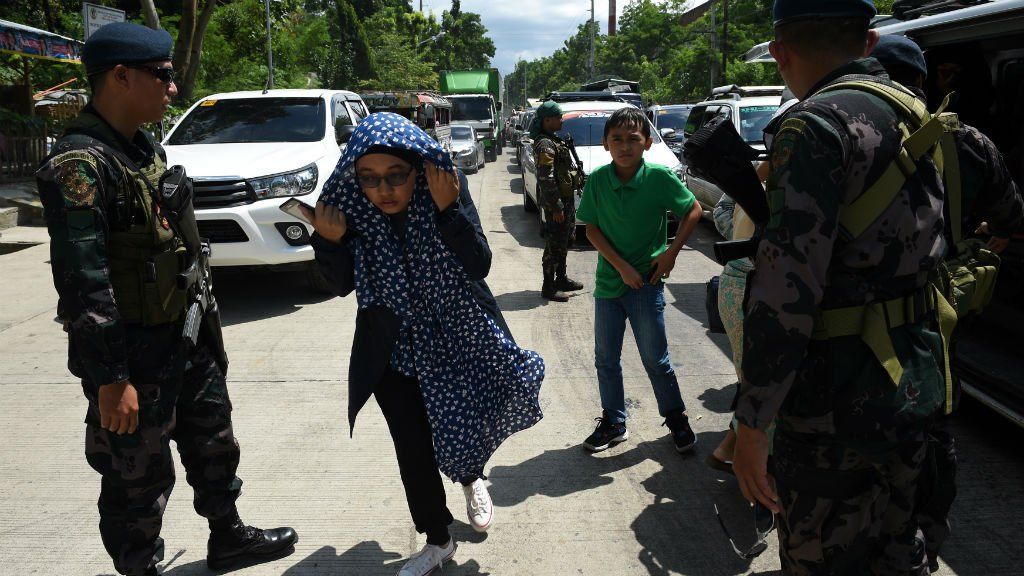Up to 2,000 Philippine civilians are caught in the crossfire between security forces and extremist militants inside the southern city of Marawi that has seen the pro-ISIS extremists attempt to establish a so-called caliphate in the area.
Security forces traded heavy gunfire with the militants on Monday as fears grew for up to the people who are unable to escape a week of fighting that has left women and children among the dead.
President Rodrigo Duterte imposed martial law across the southern third of the Philippines shortly after the fighting erupted, warning the gunmen were involved in an effort by the ISIS group to set up a local caliphate.
More than 100 people, including 24 civilians, have been killed in six days of fighting, the government said. Many more were believed to be trapped inside the city.
The street-to-street battles and a relentless military bombing campaign has so far failed to end the crisis in Marawi, one of the biggest Muslim cities in the mainly Catholic Philippines, and authorities expressed alarm about the fate of those trapped.
“They are texting us and calling us for help,” Zia Alonto Adiong, spokesman for the provincial crisis management committee, said of the 2,000 people his office had recorded being unable to leave areas held by the militants.
“They can’t leave because they are afraid of running into checkpoints put up by the gunmen.”
Authorities said the gunmen had already murdered at least 19 civilians, including women and children, while 17 members of the security forces had died in the clashes and 61 militants were killed.
Eight bodies were found on Sunday morning dumped off a bridge on the outskirts of Marawi, which is normally a bustling city of 200,000 people. Most of the city’s residents had fled to nearby towns.
But adding to the fears for those who remained, the military announced on the weekend that it would intensify a bombing campaign on the areas being held by the militants.
When asked on Monday about fears of civilians being bombed, military spokesman Brigadier-General Restituto Padilla told reporters that airstrikes would be done with precision.
However he said the bombings would continue in whichever areas the militants were hiding.
Meanwhile, an AFP reporter heard intense gunfire on Monday afternoon near the main university in Marawi, and saw smoke apparently from a bomb explosion rise up in the distance.
The violence erupted last Tuesday night when the government launched a raid to capture Isnilon Hapilon. But the operation went awry and militants rampaged through the city, torching buildings and battling government forces in the streets.
The United States regards Hapilon as one of the world’s most dangerous terrorists and has offered a bounty of $5 million for his capture.
Duterte and military chiefs have said most of the militants belong to the local Maute group, which has declared allegiance to ISIS and which the government estimates has about 260 armed followers.
He said Saturday he was prepared to enforce martial law for as long as was necessary to end the terrorist threat, and even ignore constitutionally mandated safeguards such as Supreme Court and congressional oversight.
Philippine National Police Chief Ronald de la Rosa said the operation takes time because the gunmen take advantage of the urban environment, moving quickly from building to building to evade capture.
“I cannot give operational details, but I am sure they are also human, they will also get tired,” he said.
According to government figures Monday, the death toll was 105 people — 61 militants, 20 government forces and 24 civilians.
